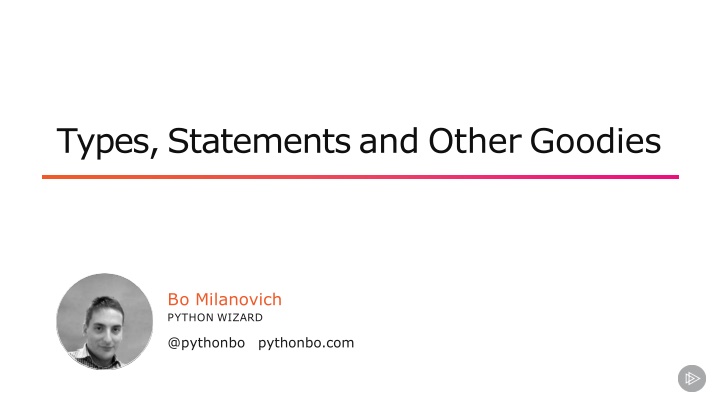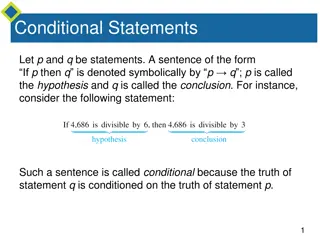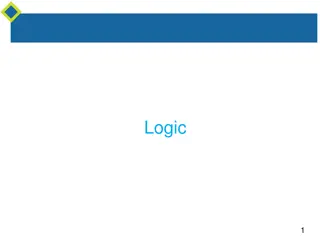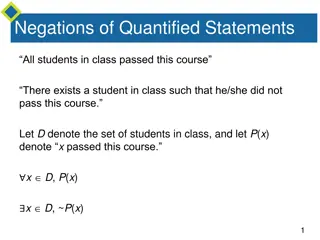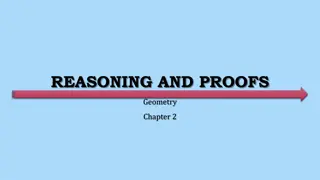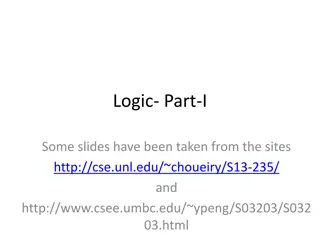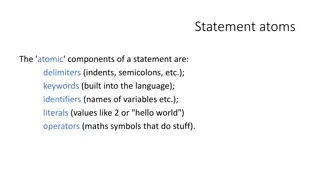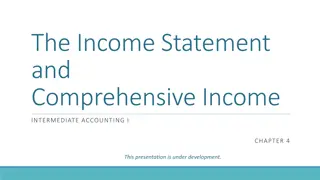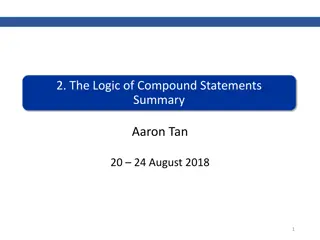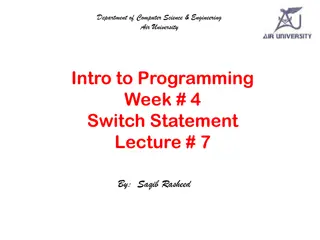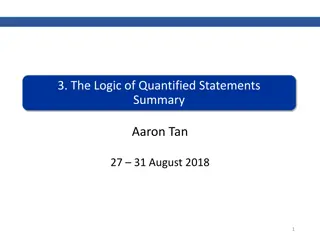Types,Statements and Other Goodies
In this intriguing content, Bo Milanovich delves into the world of Python, presenting a comprehensive guide to types, statements, and other valuable Python programming concepts. With a mix of theory and practical examples, readers will gain a deeper understanding of Python's core features and functionalities. Milanovich's expertise shines through as he navigates through the complexities of Python, making it accessible for both novice and seasoned developers. Whether you're looking to enhance your Python skills or explore new programming techniques, this content is a treasure trove of knowledge waiting to be unlocked.
Download Presentation

Please find below an Image/Link to download the presentation.
The content on the website is provided AS IS for your information and personal use only. It may not be sold, licensed, or shared on other websites without obtaining consent from the author.If you encounter any issues during the download, it is possible that the publisher has removed the file from their server.
You are allowed to download the files provided on this website for personal or commercial use, subject to the condition that they are used lawfully. All files are the property of their respective owners.
The content on the website is provided AS IS for your information and personal use only. It may not be sold, licensed, or shared on other websites without obtaining consent from the author.
E N D
Presentation Transcript
Types,Statements and Other Goodies Bo Milanovich PYTHON WIZARD @pythonbo pythonbo.com
Module Overview Data Types Flow Control Loops Dictionaries Exceptions Other Data Types
Python vs. the Others again // C# or Java int answer = 42; String name = "PythonBo ; # Python answer = 42 name = "PythonBo"
Type Hinting def add_numbers(a: int, b: int) -> int: return a + b
Integers and Floats answer = 42 pi = 3.14159 answer + pi = 45.14159 int(pi) == 3 float(answer) == 42.0 # Don t worry about conversion!
Strings 'Hello World' == "Hello World" == """Hello World""" "hello".capitalize() == "Hello" "hello".replace("e", "a") == "hallo" "hello".isalpha() == True "123".isdigit() == True # Useful when converting to int "some,csv,values".split(",") == ["some", "csv", "values"]
String Format Function name = "PythonBo" machine = "HAL" "Nice to meet you {0}. I am {1}".format(name, machine) f"Nice to meet you {name}. I am {machine}"
Boolean and None python_course = True java_course = False int(python_course) == 1 int(java_course) == 0 str(python_course) == "True" aliens_found = None
If Statements number = 5 if number == 5: print("Number is 5") else: print("Number is NOT 5")
Truthy and Falsy Values number = 5 if number: print("Number is defined and truthy") text = "Python" if text: print("Text is defined and truthy")
Boolean and None python_course = True if python_course: # Not python_course == True print("This will execute") aliens_found = None if aliens_found: print("This will NOT execute")
Not If number = 5 if number != 5: print("This will not execute") python_course = True if not python_course: print("This will also not execute")
Multiple If Conditions number = 3 python_course = True if number == 3 and python_course: print("This will execute") if number == 17 or python_course: print("This will also execute")
Ternary If Statements a = 1 b = 2 "bigger" if a > b else "smaller"
Lists student_names = [] student_names = ["Mark", "Katarina", "Jessica"]
Getting List Elements student_names = ["Mark", "Katarina", "Jessica"] student_names[0] == "Mark" student_names[2] == "Jessica" student_names[-1] == "Jessica"
Changing List Elements student_names = ["Mark", "Katarina", "Jessica"] student_names[0] = "James" student_names == ["James", "Katarina", "Jessica"]
List Functions student_names = ["Mark", "Katarina", "Jessica"] student_names[3] = "Homer" # No can do! student_names.append("Homer") # Add to the end student_names == ["Mark", "Katarina", "Jessica", "Homer"] "Mark" in student_names == True# Mark is still there! len(student_list) == 4# How many elements in the list del # Jessica is no longer in the list :( student_names[2] student_names = ["Mark", "Katarina", "Homer"]
List Slicing student_names = ["Mark", "Katarina", "Homer"] student_names[1:] == ["Katarina", "Homer"] student_names[1:-1] == ["Katarina"]
Demo Break and Continue
Printing List Elements student_names = ["Mark", "Katarina", "Jessica"] print(student_names[0]) print(student_names[1]) print(student_names[2]) ...
For Loop for name in student_names: print("Student name is {0}".format(name))
Other Code for (var i = 0; i < someArray.length; i++) { var element = someArray[i]; console.log(element); }
While Loops x = 0 while x < 10: print("Count is {0}".format(x)) x += 1
Infinite Loops num = 10 while True: if num == 42: break print("Hello World")
Dictionaries student = { "name": "Mark", "student_id": 15163, "feedback": None }
List of Dictionaries all_students = [ {"name": "Mark", "student_id": 15163 }, {"name": "Katarina", "student_id": 63112 }, {"name": "Jessica", "student_id": 30021 } ]
Dictionary Data student["name"] == "Mark" student["last_name"] == KeyError student.get("last_name", "Unknown") == "Unknown" student.keys() = ["name", "student_id", "feedback"] student.values() = ["Mark", 15163, None] student["name"] = "James" del student["name"]
Demo Exceptions
Other Data Types complex long # Only in Python 2 bytes and bytearray tuple = (3, 5, 1, "Mark") set and frozenset set([3, 2, 3, 1, 5]) == (1, 2, 3, 5)
Summar y Data types Lists Dictionaries For and whileloops Exception handling
